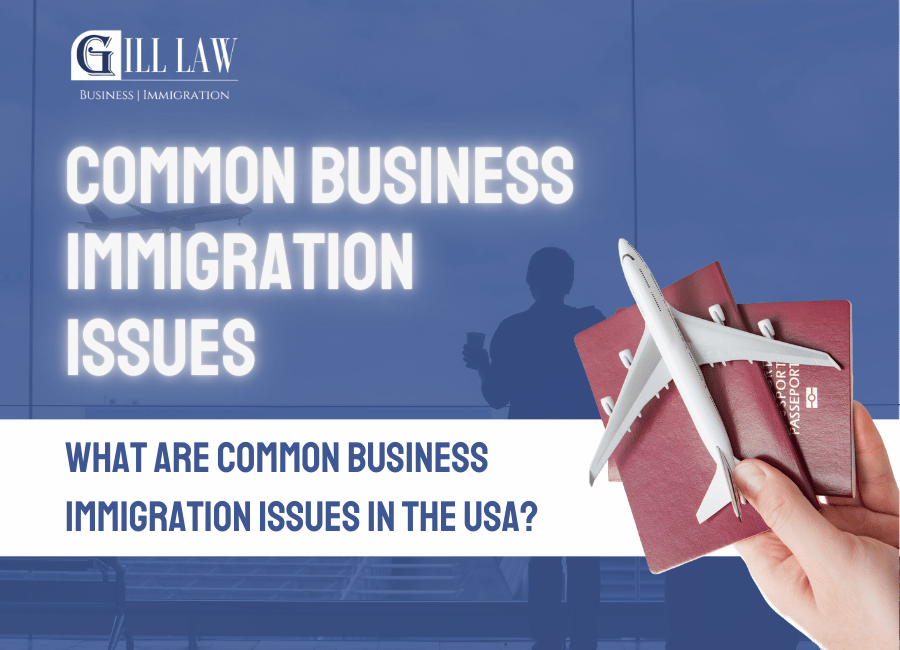Navigating Common Business Immigration Issues in the USA
- Wayne Gill

- Aug 18, 2025
- 3 min read
Updated: Sep 14, 2025

Business immigration in the USA opens doors for companies to hire global talent and for professionals to build their careers. However, while the opportunities are vast, the process can be challenging. Many employers and foreign professionals encounter obstacles that can slow down or even derail their plans.
Below, we explore some of the most common business immigration issues and how to address them effectively.
1. H-1B Visa Lottery and Limitations
The H-1B visa is one of the most well-known U.S. work visas, but it comes with significant hurdles:
The annual cap limits the number of visas issued each year.
A random lottery system means highly qualified applicants are often rejected simply due to chance.
Strict eligibility requirements limit flexibility for employers and employees.
Solution: Consider alternative visa categories, such as the O-1 visa for business, the L-1 visa for intracompany transfers, or the EB-1A Green Card for talents who are at the top of their fields. An experienced immigration lawyer can help explore options beyond the H-1B.
2. Constantly Changing Immigration Policies
Immigration laws and policies in the U.S. are not static. They can shift with political changes, court decisions, and policy memos from agencies like USCIS. This creates uncertainty for both employers and foreign workers.
Solution: Stay informed through reliable immigration news sources. Work closely with an immigration attorney who monitors policy updates daily. Proactive planning can prevent sudden policy changes from disrupting your business or career plans.
3. Long Processing Times and Delays
USCIS and U.S. consulates often experience significant backlogs. These delays can affect work start dates, travel plans, and project timelines. COVID-19 disruptions have worsened these delays in recent years.
Solution: Apply as early as possible. Consider premium processing if available, so your case can proceed faster in less than a month. Additionally, keep all documentation complete and accurate to avoid additional requests for evidence (RFEs) that could slow your case further.
4. Requests for Evidence (RFEs) and Denials
Even well-prepared petitions can face RFEs or denials. This often occurs due to insufficient evidence, unclear job descriptions, or inadequate proof of qualifications.
Solution: Work with a lawyer who can help prepare a strong initial petition that anticipates and addresses potential USCIS concerns. If you receive an RFE, respond quickly and thoroughly.
5. Compliance and Record-Keeping Issues
Employers must maintain accurate I-9 forms, labor condition applications, and other compliance records. Failure to do so can lead to penalties or even loss of the ability to sponsor foreign workers.
Solution: Implement regular compliance audits. Keep detailed, organized records. Immigration attorneys can help set up these systems to avoid costly mistakes.
6. Understanding Visa Categories
Navigating the various visa categories can be overwhelming. Each category has its own requirements and processes. Understanding these can help streamline the immigration process.
Solution: Familiarize yourself with different visa types. This includes H-1B, L-1, O-1, and EB-1A visas. Knowing the specifics can help you choose the best option for your situation.
7. The Importance of Legal Guidance
Having legal guidance is crucial in the immigration process. An experienced immigration attorney can provide valuable insights and assistance.
Solution: Seek legal advice early in the process. This can help you avoid common pitfalls and ensure that your application is as strong as possible.
Gill Law Firm Guides You Through Business Immigration Issues in the U.S.
While business immigration in the USA can be challenging, these issues are not impossible to solve with the right guidance. Whether it’s finding an alternative to the H-1B visa, staying ahead of policy changes, or avoiding delays, a strategic approach can make the process smoother and more predictable.
At Gill Law Firm, founded by Attorney Wayne Gill, we help businesses and professionals navigate the complexities of U.S. immigration law. With experience in multiple visa categories and a proactive approach to policy changes, we can help you overcome common business immigration issues and move forward with confidence.
Contact us today to discuss your immigration goals and start building your path to success in the U.S.




Comments